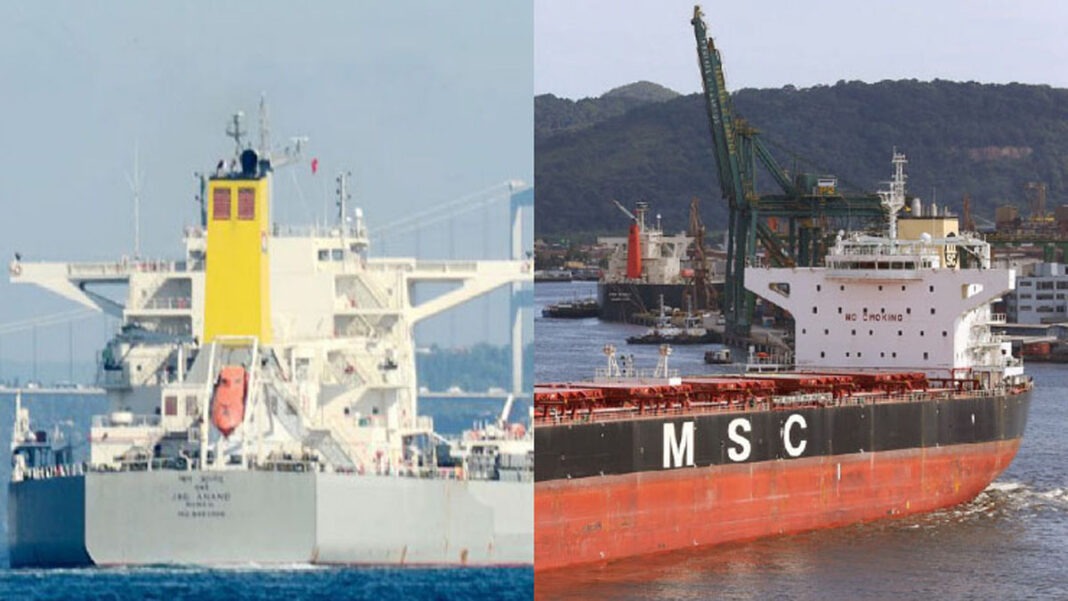INDIA.Mumbai: Forty-one Indian sailors are stranded on two merchant vessels, for the last few months, at Chinese ports, since the vessels have not been permitted to offload the cargo, due to a reported standoff between China and Australia.
The vessel “MV Jag Anand”, with 23 Indian seafarers, chartered by freight trading firm “Cargill”, has been stranded at the port of “Jintang” since June 2020, while “M V Anastasia”, with 18 Indian seafarers, is stuck at Caofeidian anchorage in China’s Bohai sea since September 2020. “MV Jag Anand” belongs to the Mumbai-based Great Eastern Shipping Company (Indian flag) and M V Anastasia (Panama flag) is owned by the Mediterranean Shipping Company S.A., a Swiss-Italian international shipping line.
“M V Jag Anand”, which started from the port Gladstone, AU, Queensland, reached the port of Jintang on June 13, 2020, while M VAnastasia, had set sail from the port of Hay Point in Queensland, reached at port Caofeidian, on Sept 20’ 2020 as per voyage information provided by Marine Traffic.Com. Both the vessels are having shipments of Australian cooking coal.
No permission to offload the cargo
However, these vessels have neither been permitted to offload their cargo nor granted permission to change the crew members, a majority of whom have been on board for more than the allowed limit of 11 months. This is stated to be due to the political and economic tensions between the two nations, which have been escalating for some time now.
Read also: World Maritime Day 2020: Theme, Significance, History, And Quotes To Honor Sailors
Because of the delay in offloading the cargo, the vessels cannot proceed further and resultantly the crew also cannot be changed. The situation of “MV Jag Anand” is worst, since its crew was already aboard for 15 months when the vessel picked up the cargo from Australia. As per international convention, a seafarer can be a maximum of 11 months at sea.
An appeal by sailors’ body
The International Transport Workers’ Federation (ITF) has been urging the Governments of China, India, and Australia to collaborate and urgently end the stalemate around the berthing of the coal-carrying vessels in Chinese ports. In a statement dated November 17, 2020, the ITF had appealed to the Governments of all three countries to take speedier action in the matter. But on avail.
Abdulgani Y. Serang, General Secretary of the National Union of Seafarers of India (NUSI) and member of the executive board of ITF, in his statement said that his union and the ITF have been raising the issue repeatedly with the company and official channels through the International Maritime Organisation. “We have at hand a humanitarian crisis on board where the entire crew is fatigued and requires urgent relief. They are mentally and physically exhausted due to their prolonged time onboard, Serang added.
“The ship owners are trying their best to have the ship cargo discharged and have offered to charter a flight to do the crew change. The Indian Government is also trying to help salvage the situation, but the stalemate continues. We are surprised that efforts to take the ship to another country or another Chinese port are being resisted. Whatever the reason for this stalemate, we call on all governments to put aside their disputes and focus on supporting these seafarers to get home and be refreshed by the new crew”, Serang said.
Indian Ambassador to China Vikram Misri, based in Beijing did not respond to an e mail message sent by “Transcontinental Times” to know the latest development.
As per the past developments, in 2017, Australia banned foreign political donations citing reports of Chinese attempts to influence the political process in Canberra. The following year, it banned Chinese tech giant “Huawei” from its 5G network and subsequently blocked 10 massive Chinese investment deals in Australia. The country has also been openly critical of China’s actions in Hong Kong, Taiwan, and the South China Sea. This year, when Australia supported calls for an independent inquiry into the origins of the coronavirus, it was the straw that broke China’s back.



